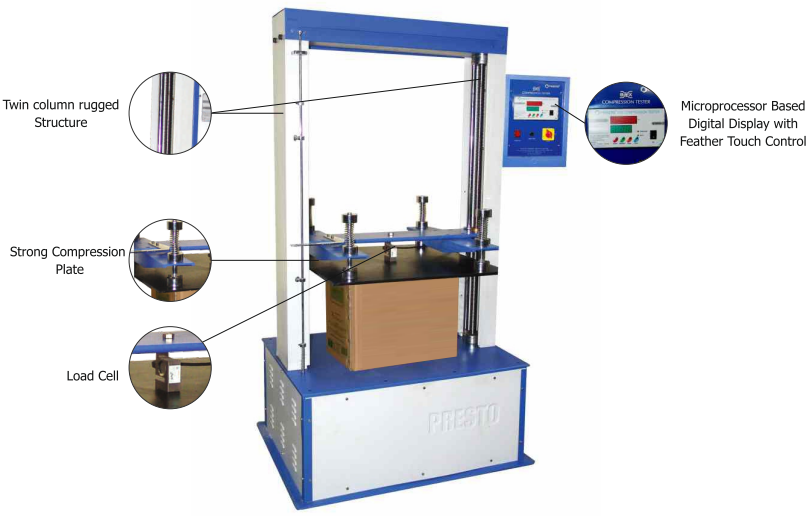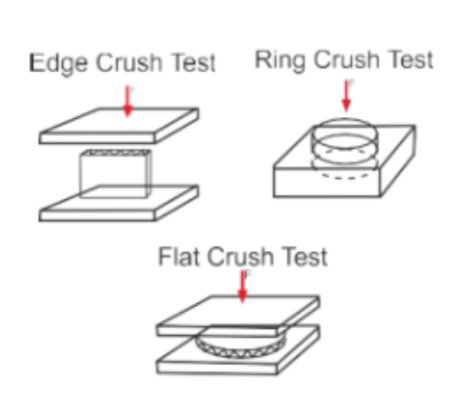- /
- Blog / Complete Guide to Using a BCT Calculator for Box Compression Testing
Complete Guide to Using a BCT Calculator for Box Compression Testing

In the packaging industry, ensuring the strength and durability of corrugated boxes is essential. A weak box can collapse under pressure, causing damage to the product and leading to unnecessary losses. That’s where Box Compression Testing (BCT) comes into play. One of the most effective tools for calculating the compression strength of boxes is the BCT Calculator.
In this guide, we will walk you through what a BCT Calculator is, how it works, and how to use it effectively using various methods like the McKee Formula, the Ring Crush Test, and more. Whether you're a packaging engineer or a box compression tester manufacturer, understanding BCT calculation is key to quality control.
What Is a BCT Calculator?
A BCT Calculator (Box Compression Test Calculator) is a digital tool that helps determine the compression strength of a corrugated box. It calculates the force a box can withstand when stacked, without being crushed.
The calculation is generally based on three main factors:
- Edge Crush Test (ECT) value – measured in pounds per inch (lbs/in)
- Box perimeter – sum of all four vertical sides of the box (in inches)
- Board thickness – total thickness of the corrugated board (in inches)
Once these values are entered, the calculator computes the Box Compression Test strength using formulas like the McKee Formula, helping you estimate how much stacking pressure the box can handle.
Understanding the McKee Formula
The McKee formula calculator is widely used in the packaging industry to calculate the BCT strength. It is:
BCT = 5.87 × ECT × √(Thickness × Perimeter)
Where:
- BCT is the Box Compression Test value (in pounds)
- ECT is the Edge Crush Test value
- Thickness is the corrugated board thickness (in inches)
- Perimeter is the total of the box’s height and width multiplied by 2 (i.e., 2 × (L + W))
This formula gives a close estimate of the top-to-bottom compression strength a regular slotted container (RSC) can tolerate under standard conditions.
How Does a BCT Calculator Work?
Instead of manually solving the McKee formula, a BCT Strength Calculator does the math for you. All you need to do is:
Enter the Edge Crush Test (ECT) value, the box perimeter (in inches), and the board thickness (in inches) into the calculator. It will compute the estimated BCT value automatically.
.jpg) This makes the process fast, accurate, and accessible for quality control teams and box designers.
This makes the process fast, accurate, and accessible for quality control teams and box designers.
Why Use a Box Compression Test Calculator?
Using a box compression test strength BCT calculator offers multiple benefits:
- Time-saving: Instantly gives compression strength values
- Error-free calculation: Reduces manual errors
- Better design decisions: Helps engineers choose materials based on load requirements
- Improves safety and compliance: Ensures that packaging meets stacking and shipping standards
Whether you're in production, R&D, or are a box compression tester manufacturer, this tool is vital for efficient packaging design and testing.
What Is a Box Compression Tester?
A Box Compression Tester is a physical machine that evaluates the stacking strength of a box by applying controlled compression until the box collapses. It’s widely used alongside BCT calculators for accurate data collection and quality assurance.

Leading box compression tester manufacturers provide machines that meet international standards like ASTM D642 or ISO 12048. These machines provide actual BCT values which can be cross-verified using digital calculators.
Role of Ring Crush Test in BCT Calculation
The Ring Crush Test (RCT) is another method to assess the strength of the linerboard. While ECT combines the effects of the liners and flutes, RCT focuses solely on the linerboard’s ability to resist compression.

Though RCT isn’t used directly in the McKee formula, it's an important supporting test that contributes to the ECT value, which then feeds into the BCT strength calculator.
Sample BCT Calculator Table
Here is a sample table showing how different values impact the BCT strength using the McKee formula:
| ECT (lbs/in) | Thickness (in) | Perimeter (in) | Calculated BCT (lbs) |
| 32 | 0.25 | 60 | 864 |
| 44 | 0.28 | 80 | 1367 |
| 55 | 0.30 | 90 | 1775 |
| 60 | 0.32 | 100 | 2093 |
Note: These values are rounded approximations.
Who Should Use a BCT Strength Calculator?
- Packaging Engineers
- Corrugated Box Manufacturers
- Logistics & Warehouse Managers
- Quality Control Departments
- Box Compression Tester Manufacturers
If you’re involved in any part of the packaging lifecycle, using a BCT calculator ensures that your boxes meet compression strength standards for safe transport and storage.
Tips for Accurate BCT Calculation
- Measure Correctly: Ensure your ECT, thickness, and perimeter values are precise.
- Use Reliable Data: Obtain ECT values from certified testing labs or in-house quality labs.
- Understand Board Design: Know if your box design is an RSC, HSC, or another type, as the McKee formula assumes an RSC structure.
- Don’t Ignore Environmental Factors: Humidity and temperature can affect BCT. Always consider actual testing for final validation.
Frequently Asked Questions (FAQs)
Q1. What is the difference between BCT and ECT?
ECT (Edge Crush Test), measures the edgewise compressive strength of the board, while BCT (Box Compression Test) evaluates the overall compression strength of a finished box. ECT is one of the inputs for calculating BCT.
Q2. Can I use the BCT calculator for all box types?
The BCT Calculator, especially the McKee formula, is best suited for Regular Slotted Containers (RSC). For other box designs, actual compression testing is recommended.
Q3. Is the BCT calculator 100% accurate?
The BCT calculator gives an estimated strength based on standardized inputs. While it's close, real-world performance should be validated with a Box Compression Tester.
Q4. How does the Ring Crush Test relate to BCT?
The Ring Crush Test helps determine linerboard strength, which influences the Edge Crush Test (ECT) value — a key input in the BCT calculation.
Take Control of Your Packaging Quality
A BCT Calculator is a essential tool for packaging companies that want to ensure their boxes can withstand real-world stacking and shipping conditions. By using standardized formulas like the McKee formula and reliable test data such as ECT and Ring Crush Test results, businesses can easily estimate compression strength and optimize their packaging design.
At Presto Group, we offer not just the tools, but also the expertise behind them. Our high-quality Box Compression Testers and other testing equipments are designed to help packaging manufacturers, QA teams, and logistics managers test with confidence and precision.
Looking to upgrade your packaging quality control?
Choose a trusted box compression tester manufacturer—Presto Group.
Call us at +91 9210 903 903
Email: info@prestogroup.com
Recent Blogs
- Controlled Humidity Chamber: Environmental Testing Methods, Applications & Packaging Testing Use Cases
- Spectrophotometer & Portable Spectrophotometer: Working Principle and Laboratory Applications
- Paint Tester & Coating Testing Equipment: Types, Testing Process, and Industrial Applications
- Moisture Meter: Types, Working Principle & Applications in Industrial Labs
- Environmental,Pharmaceutical, and Research Laboratories in BOD Incubator



